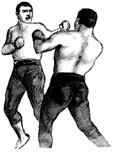
The Way Jesuits Used to Be
GUEST COLUMN
What do you say to a white-haired old man in a black “bathrobe” toting a matching briefcase? “Court’s in session in the cabana, Your Honor”? It was the first time I had ever seen a Jesuit, and I was both spooked and fascinated. I was used to kindly, comfortable parish priests in suits, but this guy — these guys — were something different: brisk, no-nonsense, “in-your-face” drill sergeants in insignia-free uniforms and far from slow to say that they had been given charge of some terribly unpromising raw recruits. Soon there’d be much more to worry about than how that wrap-around, buttonless, zipperless cassock stayed put; there was no time for idleness — or student wisecracks — in the Latin class of Arthur Walter, S.J.
From the second day until the end of the year, you began by passing forward your homework, in ink with no scratch-outs, never in pencil or without the obligatory heading of name, date, and A.M.D.G. (ad maiorem Dei gloriam, for the greater glory of God). Into the aged briefcase it went, exercises in Latin to English, English to Latin. From the third day on, and without fail, you came to class and found the previous night’s work waiting for you face down on the desk every error (down to vowel length marks) corrected in a meticulous hand, and a percentage grade written at the top. He did that every day, for five classes of 35 to 40 students each, for I never learned how many years, in a demonstration of dedication hard to match apart from Inspector Javert in Les Miserables.
There was one escape, however. It was called an “exemption,” and you earned one by besting the kids in your row in the sudden oral quizzes that were more like a cross between a gladiatorial show and a police line-up, with Father as Emperor Joe Friday seeking “just the facts” and determined to get them. After he chose a timekeeper from among the (temporary) spectators, the first group of combatants slunk forward, each to be participially probed, declensionally decimated, and generally found wanting — within 10 seconds:
“That they may have been praised,” came the pitch.
“Huh?” And down went Casey at the bat.
“Was that ‘praised’?” stalled another.
You May Also Enjoy
A Masterpiece of Precision... Baffled by Rebellion... A Breath of Fresh, Pennsylvanian Air... From Blavatsky to Buffy... Prisons: Satan's Property... and more
Resisters were divided on whether their aim was to preserve intact the integrity and identity of the Church or whether activity to eradicate Nazism was demanded.
Our Collective Moral Failure... The Purpose of an Origins Story... Fiction Must Not Contravene Logic or Dogma... What We Have Lost... and more

